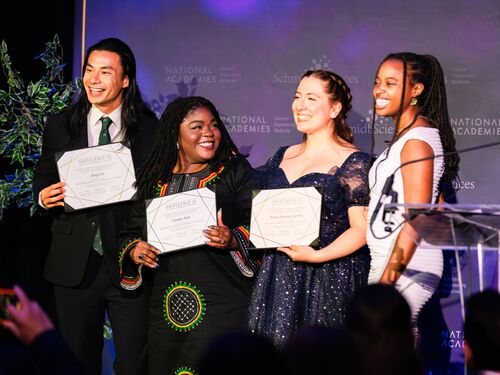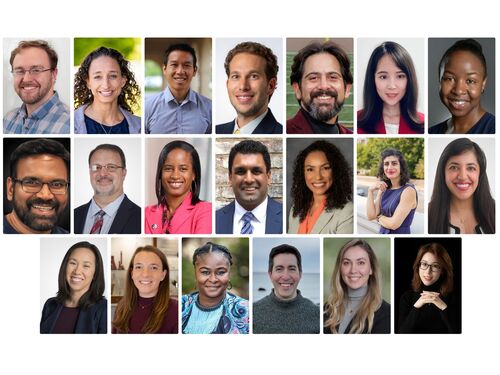Gulf Research Program Awards Over $3M for Workforce Development to Support the Energy Transition
News Release
By Pete Nelson
Last update January 21, 2025
WASHINGTON — The Gulf Research Program (GRP) of the National Academies of Sciences, Engineering, and Medicine announced today an award of over $3 million to support seven projects that will provide pathways for Gulf Coast residents aged 16-25 to enter high-quality jobs that enable the energy transition. These training programs provide participants with the skills, knowledge, and credentials needed to become the leaders and professionals of the future energy workforce.
The energy transition, a global challenge to shift away from primarily carbon-based energy such as coal and natural gas to carbon pollution-free sources of energy such as solar and hydrogen, will have significant impacts on the Gulf of Mexico region, an energy hub for the U.S. Many nations, including the U.S., have set goals for net-zero carbon emissions. This push toward net-zero emissions requires a diverse and skilled workforce capable of supporting and implementing clean energy technologies.
“We are excited by the diversity of these projects and their ability to provide opportunities for young people to gain skills that will support a range of emerging energy sectors in the Gulf region,” said Karena Mothershed, program director of GRP’s Board on Gulf Education and Engagement.
The awarded projects are:
Strengthening Minority Opportunity Youth Participation for a Future-Ready Energy Literate and Resilient Workforce
Project Director: Berneece Herbert, Jackson State University
Project Location: Jackson, Mississippi
Award: $499,996
Project Team:
Caitlin Brooking, Refill Jackson Inc.
Eric Shanks, HRC
Felicia Trip, Just Green Mississippi
Project Summary: This project will develop an energy literacy and resilience workforce training initiative to strengthen the participation of youths in a future-ready workforce and accelerate the journey to net-zero in energy industries in Mississippi. As climate actions create new jobs, they also provide opportunities to address racial and social inequities in the labor market. The overarching goal of this project is to use a network of experienced partners to implement a future-ready energy workforce development program to assist minority opportunity youth to work toward rewarding careers, equipping them with employment and life skills required to succeed in the high-growth energy industry.
Florida Clean Energy Pathways Program
Project Director: Jennifer Szaro, Association of Energy Services Professionals
Project Location: Central Florida (Hillsborough, Orange, Pinellas, Polk, and Seminole counties)
Award: $494,557
Project Team:
Lauren Beavers, Association of Energy Services Professionals
Greg Blair, Julius Education
Daniel Goldsmith, Julius Education
Jennifer Lee, Association of Energy Services Professionals
Project Summary:
This project is designed to address the evolving needs of Florida’s clean energy sector by integrating AI-powered labor market analysis with dynamic educational programming. By harnessing real-time labor market data and industry insights, this project identifies critical roles and necessary qualifications within Florida’s clean energy market, tailoring educational experiences that align with employer demands.
The program offers youth career assessments and orientation training that bridge the gap between education and employment, guiding participants toward apprenticeships, certifications, or direct-to-employment pathways. It also engages underrepresented groups to diversify the energy workforce and builds robust partnerships across academia, industry, and nonprofit partners. Participants receive milestone stipends and benefit from personalized support such as coaching and mentorship, further bolstered by subsidized support services including transportation.
Training for Marine Survey Careers to Support Coastal Energy and Infrastructure Development Project
Director: William Sager, University of Houston
Project Location: Houston, Texas
Award: $491,580
Project Team:
Robert Stewart, University of Houston
Sriharsha Thoram, University of Houston
Kevin Tomanka, OARS Group
Sissy Wong, University of Houston
Project Summary: Coastal regions are critical to the energy transition, in part because of anticipated offshore wind development. Offshore wind begins with marine surveying — mapping the seafloor, subsurface, and environment — to allow development and resource management. Anticipated wind lease sales are driving a need for marine survey companies to hire new employees. This project is an industry-academia collaboration between the Hydrographic Society of America (THSOA) and the University of Houston. This collaboration will develop an intensive course in which students learn background information and survey methods, collect data at sea, and take a short course on popular sonar processing software using the data that they collected. The course will offer college credit for degree seekers and a certificate. THSOA will also provide opportunities for students to network and find jobs.
Weatherizing Every Residence in the South East (WERiSE) Training for Home Energy Renovation in Underserved Communities
Project Director: Stephen Guesman, The People’s Justice Council
Project Location: Birmingham, Alabama
Award: $245,344
Project Team:
Kyle Crider, The People’s Justice Council
Geri Freedman, The People’s Justice Council
Project Summary:
WERiSE is a project of the People’s Justice Council, a member of America’s first Justice40 Accelerator cohort. The Gulf region experiences a high prevalence of energy burden and energy poverty. Simple, low-cost air sealing alone can reduce energy bills by 10%-30%. The project trains home energy renovators to do air sealing and other low-cost energy efficiency improvements in energy-burdened communities. WERiSE uses a train-the-trainer approach to make home energy renovation accessible while keeping dollars and economic power in local communities. WERiSE enlists local houses of faith and community development organizations to identify, train, and support locally based, self-sustaining home energy renovation crews in underserved communities in Alabama and throughout the Gulf region.
EMERGE: Educational Microgrid for Enhancing Renewable Growth and Education
Project Director: James Fletcher, University of North Florida
Project Location: Jacksonville, Florida
Award: $445,151
Project Team:
Fnu Ankush, University of North Florida
William Lear, University of North Florida
Sumit Raj, University of North Florida
Elizabeth Rozas, University of North Florida
Xavier Rozas, University of North Florida
Project Summary:
This project aims to develop critical technical skills and provide widely recognized credentials to early-career electricians. The project team will collaborate with industry partners to create course credentials, training modules, and a “Microgrid Technology Certification” to prepare early-career electricians for the evolving energy sector. Industry partners will identify 16 early-career electricians for comprehensive hands-on training focused on renewable energy and systems integration.
The EMERGE project will also be customized to include course modules and hands-on training specifically designed for high school students in Northeast Florida. To support high school students’ participation, job opportunities and mentorship will be provided through summer internships with industry partners, enhancing access to career pathways in the energy sector. EMERGE will act as a pilot project for a sustainable pipeline of skilled workforce to meet the future demands of the clean energy sector in Florida and beyond.
Virtual Reality Enhanced Curriculum for a Clean Energy Workforce in the Gulf States
Project Director: Marty Riesberg, electrical training ALLIANCE
Project Location: Florida, Louisiana, and Texas
Award: $499,856
Project Team:
Robert Cruz, Daytona Beach Electrical Joint Apprenticeship and Training Committee (JATC)
Gabriel Flores, Austin Electrical JATC
Shawn Graves, Gainesville Electrical JATC
Matt Green, Monroe Electrical JATC
David McCraw, Tampa Electrical JATC
Darryl McGaha, Baton Rouge Electrical JATC
Tina Williams, electrical training ALLIANCE
Project Summary:
This project seeks to enhance electrical apprenticeship training through hands-on virtual reality (VR) curriculum. Collaborating with six JATCs across Louisiana, Florida, and Texas, the project targets future and existing apprentices in the Gulf region to increase the skilled workforce for the clean energy transition.
The project will develop, test, and implement a VR module on clean energy system safety to over a thousand apprentices across six JATC partner locations. By leveraging VR technology as a recruitment and retention tool, the project aims to diversify and expand the pool of skilled electrical workers in the Gulf region. VR modules significantly accelerate learning, reduce time spent in theoretical settings, and provide cost-effective simulation of complex scenarios like wind turbine maintenance. This efficiency greatly benefits training centers, allowing them to invest in larger classes of apprentices. Partnerships across sectors, including in education, industry, and local nonprofits, further enrich the project’s impact, ensuring a robust pipeline of prospective apprentices and guaranteed industry jobs for graduates.
Project Elevate-Urban Youth Empowerment Program
Project Director: Rommell Williams, Houston Area Urban League
Project Location: Houston, Texas
Anticipated Budget: $492,398
Project Team:
Eric Goodie, Houston Area Urban League
Harvey Kelley, Houston Area Urban League
Jian (Jason) Shi, University of Houston
Project Summary:
This project will provide economic empowerment through a workforce development initiative that will provide youth with the essential skills needed to successfully find a career in high-demand/high-growth and emerging energy sectors, including solar, wind, and hydrogen. The primary focus of the project is to connect participants in preparatory training and/or pre-apprentices from communities of color to registered apprenticeship programs in the clean energy industry. The Houston Area Urban League will identify and provide preparatory training skill-building services, including registered apprenticeships, and occupational training for in-demand industries that lead to industry-recognized credentials. As an academic partner, the University of Houston will provide a comprehensive environment for technology training and development in software development, artificial intelligence, machine learning, data science, and cybersecurity.
The National Academies’ Gulf Research Program is an independent, science-based program founded in 2013 as part of legal settlements with the companies involved in the 2010 Deepwater Horizon disaster. It seeks to enhance offshore energy system safety and protect human health and the environment by catalyzing advances in science, practice, and capacity to generate long-term benefits for the Gulf of Mexico region and the nation. The program has $500 million for use over 30 years to fund grants, fellowships, and other activities in the areas of research and development, education and training, and monitoring and synthesis.
The National Academies of Sciences, Engineering, and Medicine are private, nonprofit institutions that provide independent, objective analysis and advice to the nation to solve complex problems and inform public policy decisions related to science, engineering, and medicine. They operate under an 1863 congressional charter to the National Academy of Sciences, signed by President Lincoln.
Contact: Pete Nelson, Director of Public Engagement and Communications Gulf Research Program email PNelson@nas.edu
More like this
Discover
Events
Right Now & Next Up
Stay in the loop with can’t-miss sessions, live events, and activities happening over the next two days.
NAS Building Guided Tours Available!
Participate in a one-hour guided tour of the historic National Academy of Sciences building, highlighting its distinctive architecture, renowned artwork, and the intersection of art, science, and culture.



